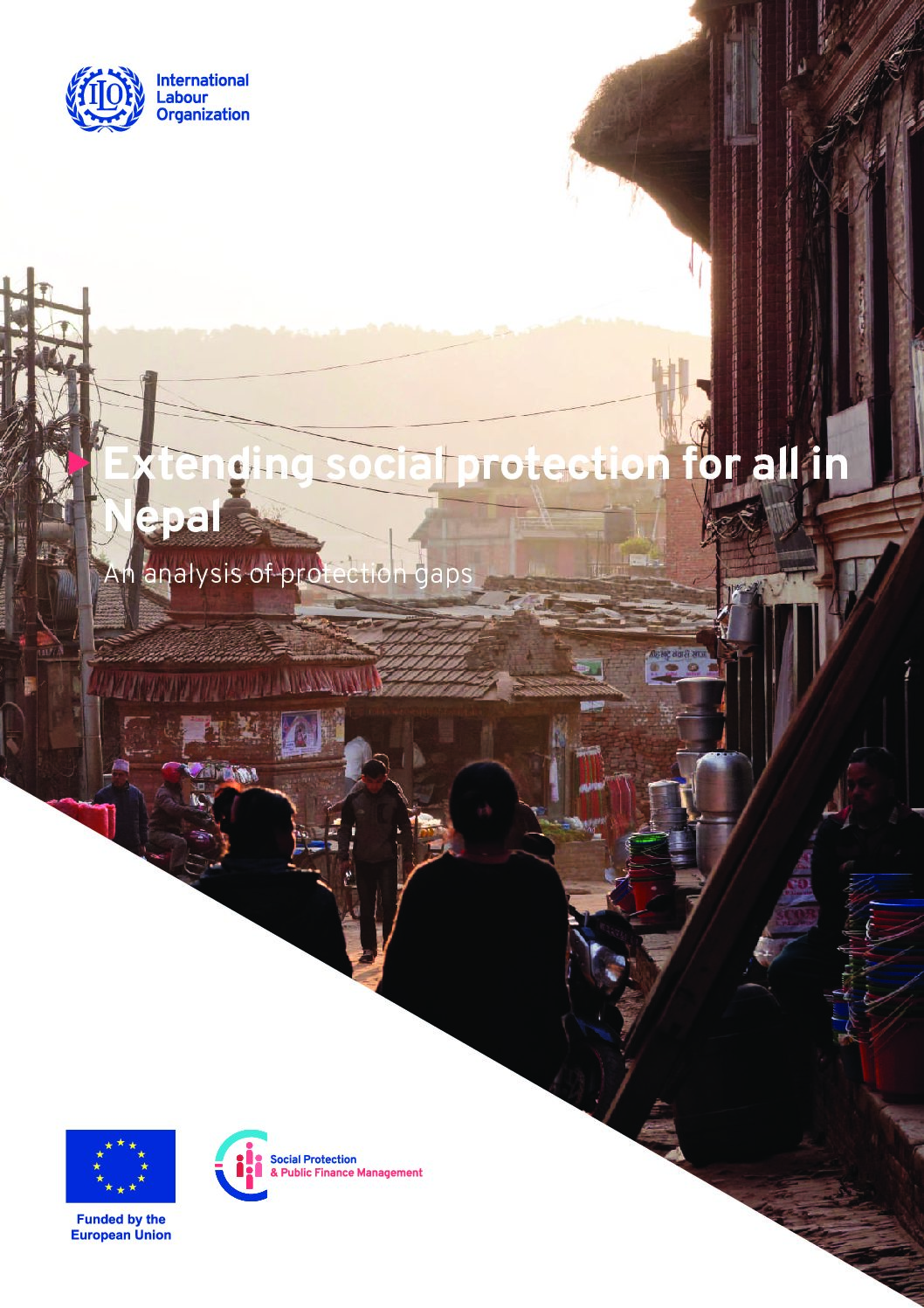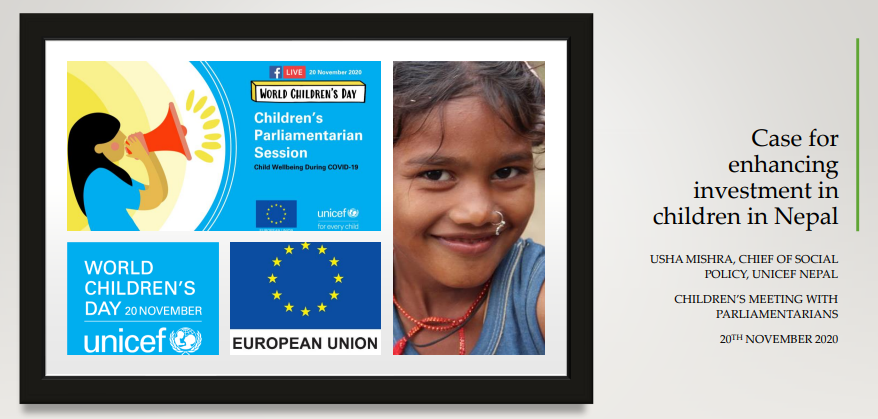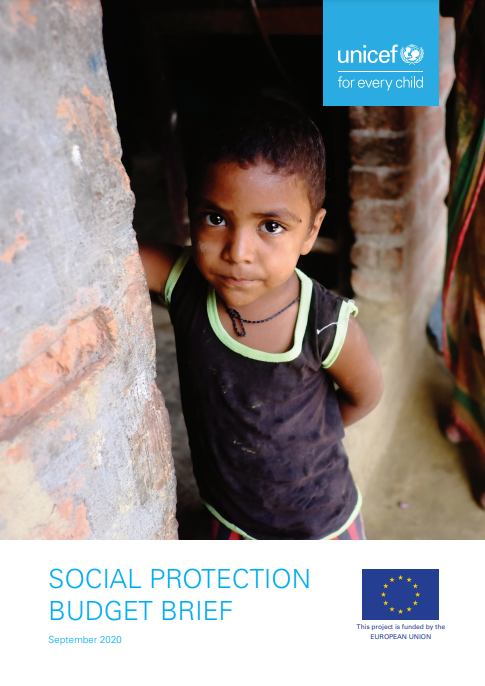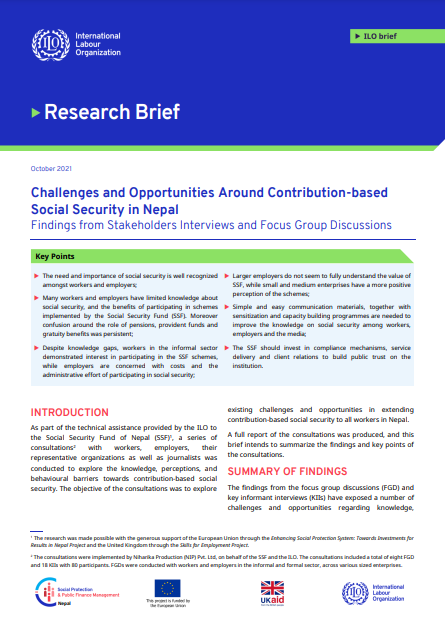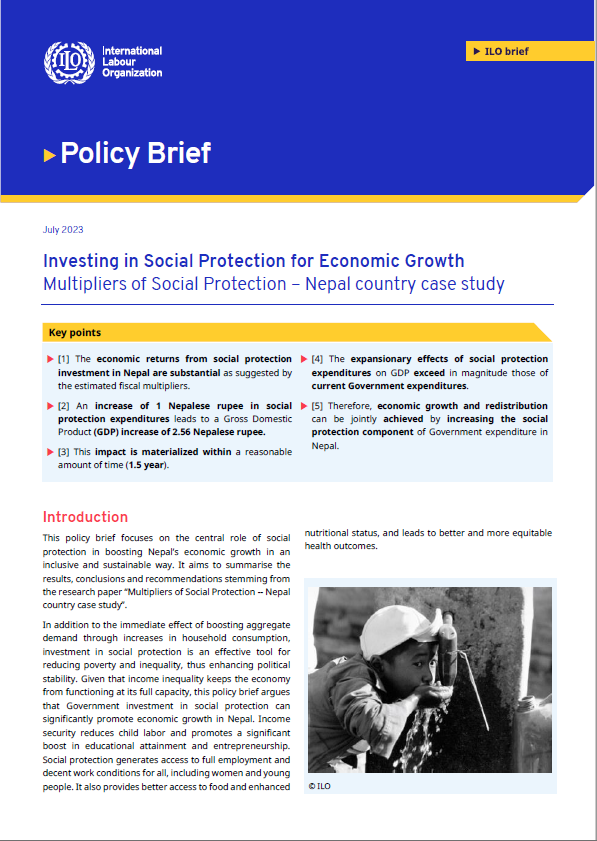Nepal

662,201 workers registered in the Social Security Fund
By mid-July 2023, the number of workers registered in the SSF more than increased by more than 5 times, from a baseline of 147,643 in 2019. While this has been a result of the slow maturation of the schemes, the Project also worked closely with the MoLESS, the SSF, and social partners in communications and awareness as well as on extensive orientation and trainings on contribution-based social security in Nepal.
1,900 marginalized households covered by cash transfer programme
This shock responsive programme, implemented by SP&PFM in coordination with Jaleshwar Municipality of Madhesh Province, provides support to landless, daily wagers and families with disabilities and children under 5 in flood prone areas in the Municipality.

Extension of contribution-based social security to workers in the informal sector and self-employed
Critically, the Government also started taking effective steps towards moving in a coordinated and integrated approach for formalization in the country with the Formalization Action Plan endorsed in August 2022, an important step towards formalization of enterprises and workers in informal employment. In December 2022, regulations for expansion of social security schemes to workers in informal employment and self-employed was announced with expected implementation to begin in April 2023.
Social protection is a fundamental right recognised in the Nepalese Constitution of 2015 (Article 43) and a priority for the Government of Nepal. Several pieces of legislation enacted in recent years pave the way to the operationalisation of health insurance, social insurance and social assistance schemes in the country. Furthermore, the National Planning Commission has drafted an Integrated National Framework on Social Protection, submitted to the Parliament for adoption, aiming to make the national social protection system inclusive, flexible, and effective and to ensure access to all citizens.
The Government of Nepal operates a range of social protection programmes consisting of employment-related schemes, cash and in-kind social assistance and labour market programmes. According to the National Integrated Social Protection Framework, different ministries and public institutions implement 16 types of programs and 76 schemes. Based on the Red Book of the Ministry of Finance that details the budget allocations in 2018/19, social protection expenditure amounted to approximately 3.9% of the GDP.
The EC-INTPA Project on Enhancing Social Protection System: Towards Investments for Results in Nepal aimed to support the Government of Nepal in improving social protection policies, financing strategies, coordination mechanisms, and implementation and monitoring systems, to increase coverage to the excluded, including persons with disabilities, workers in the informal economy and people living in disaster-prone areas.
Key results achieved
Despite the continuous challenges due to the COVID-19 pandemic, the Project continued the timely implementation of its activities and achieved substantial results to continue advancing social protection in Nepal, thanks to the development of successful partnerships and the mobilisation of key stakeholders.
Some of the project achievements include:
- Good governance and inclusion practices resulted in particularly at the local level due to the capacity building and advocacy initiatives that the project conducted targeting to the key government officials. Such practices included enabling local government to adopt new model for disability screening, citizens’ participation in budget formulation process; institutionalization of public hearing system to dessiminate, share and get feedabck and hear the voice of rights holders; improving the delivery modalities of social security allowances (SSA) at the doorsteps of rights holders particulaly the senior citizens and people with disabilities; institutionalization of grievance handling mechanisms at the local level; and inclusion of excluded rights holders in SSA programs. An Innovative Model for Disability Screening, designed and recommended by this project funded research, was rolled out in four municipalites which have found the Model very helpful to screen the functional limitations of people with disabilities. Hence, the federal government has also made a commitment to roll out this Model across the country. 140 people with disabilites of these four municipalites received identity cards following their functional limitations screened using this Innovative Model. The longly-awaited Integrated National Social Protection Framework (Framework) was finally approved by the National Planning Commission (NPC). The Framework intends to coordinate and integrate social protection initiatives scattered to and implemented by 13 different federal ministies and other agencies at all levels. The Framework has provisions for national and provincial level structures to coordinate and integrate social protection programmes. Social Security Act 2018 got first amendament in 2022 which, inter alia, expands the elegibility criteria of SSA programs beneficiaries. The Government of Nepal, in its Annual Plan and Budget FY2022/23 re-asured its commitment to the life cycle approach to social security; to implement social security program through single window system in an integrated manner; and to include the foreign migrant workers and self-employed labourers under the scope of the social security programme.
- The project contributed to the strengthening of the Beti Padhau-Beti Bachau (Education Girls-Save Girls) programme by deploying a design team to review and propose improvements in design aspect of the programme to make it more effective and impactful and make it a universal programme across the province. Similarly, Karnali province also decided to make the similar programme named Bank Khata Chhoriko Suraksha Jivan Variko (Girls Insurnace/Girl Baby Bond Schemes) universal.
- Implementation of critical interventions related to public finance management (PFM) in line with the Government of Nepal’s priority in strengthening the framework to improve overall governance, optimise outputs from public resources, and ensure inclusive, broad-based and sustainable development. These included:
- Support in conducting an actuarial valuation of the existing social security schemes, using the data gathered in the first two years of implementation of the provisions, to support the policy dialogue to address some of the concerns raised by certain sectors of the economy, and to ensure the financial sustainability of the schemes. The key findings of the report were discussed with the counterpart in January 2023, with publication planned for later that year;
- Undertaking a series of studies to review Nepal’s existing social protection system, understand its gaps and challenges, and identify potential strategies to extend the coverage, improve the adequacy of schemes and secure sustainable financing. The first assessment in the series Extending social protection to all in Nepal: An analysis of protection gaps, was finalized in 2022 and looks at existing coverage gaps within the social protection programmes in Nepal. The Project, in collaboration with the National Planning Commission (NPC) organized a findings workshop in November 2022 that included participation from key Government ministries, workers’ and employers’ organizations, and international development partners. The workshop was chaired by Honourable Dr. Ram Kumar Phuyal, Member of the National Planning Commission. The report (expected to be published in 2023) was acknowledged as one of the first amongst many in terms of providing a comprehensive review of the social protection system for the country. Following the report, the Project worked on a costing and fiscal space analysis exercise to estimate financing gaps and to provide recommendations on potential avenues to further create fiscal space to finance a sustainable social protection system in the country. The work was expected to be completed in April 2023.
- The Capacity building interventions on public finance management began in 2021and were continued in 2022 as well. In 2022, 25 provincial level senior government officials of Madhesh province received the training which covered the multi-dimensions of public finance management system including inter-governmental fiscal transfer, the role of various actors including the National Natural Resource and Fiscal Commission, child-focused planning and budgeting, and children’s participation in public finance management system.
- UNICEF established a formal partnership with the National Natural Resource and Fiscal Commission (NNRFC). The Constitution of Nepal 2015 introduces NNRFC as a constitutional body and custodian of fiscal federalism with the constitutional mandate to provide evidence-based recommendations to the federal and provincial governments for, inter alia, equitable sharing of resources.
- A Policy Brief titled ‘Coverage of Social Security Allowance in Nepal’ has been published. The Policy Brief put forwards some policy recommendations to the Government of Nepal and other stakeholders to expand the program coverage and include the excluded rights holders.
- The Ministry of Finance was supported to establish an Economic Lab to promote evidence-based policy making process. To this end, the Lab is intended to be engaged in problem solving, researching, modeling, and analysing contemporary policies and their effectiveness in achieving policy goals. The Economic Lab also focus on learning the impacts of public policies on most vulnerable groups, strengthening the public finance data base system; publishing policy briefs; and capacitating the human resources within the Ministry of Finance and sectoral ministries. At the time of conclusion of the SP&PFM Project, the Lab was at its initial preparatory stage and working on scoping, strategic and long-termed planning. The economic lab also intends to contribute to the analysis of the social impact of budget and aims to produce policy briefs on high inflation and its impact on the most vulnerable groups, financial social protection and so on.
- Four policy briefs on education, health, revenue mobilisation and expenditure allocations were produced, providing a summary of the expenditures proposed in the most recent budget and examining trends over time, allocations to different levels of governments, major expenditure headings, and the functioning allocation of the budget, particularly from both the equity and gender lenses.
- Significant advances were made in the extension of contribution-based social security to workers in the informal sector and those in self-employment in 2022. Over the course of two years, the Project provided technical assistance to the Ministry of Labour, Employment, and Social Security (MoLESS) and the Social Security Fund (SSF) on the design of contribution-based social security schemes for workers in the informal economy and self-employment, possible implementation modality, as well as costing of schemes for sustainable financing. Critically, the Government started taking effective steps towards moving in a coordinated and integrated approach for formalization in the country with the Formalization Action Plan endorsed in August 2022, and important steps towards formalization of enterprises and workers in informal employment. The SSF also launched the new regulations for contribution-based social security for workers in informal employment in December 2022 that reflected the brief’s recommendation on the need for policy coherence on the definition of informality and costing of individual schemes to ensure fiscal sustainability in the long-term. In addition to taking the critical step towards formalizing enterprises and workers in the informal sector.
- Technical support to the Government of Nepal in the expansion of contribution-based social security. The Project supported technical interventions related to social protection coverage for informal economy workers, including the design, the implementation strategy and the actuarial valuation/costing of the schemes. The Project also supported the government in addressing the slow take-up in contributory social security and resistance to enrolment amongst those in the formal sector. At the end of 2021, the number of workers registered in the Social Security Fund reached 305,103 and more than doubled compared to the baseline of 147,643 in 2019.
- Advancing the agenda on shock-responsive social protection (SRSP). As a result of continuous advocacy, learning and sharing, the Government of Nepal, under the Project guidance, initiated the development of a national shock-responsive social protection/ cash policy. The National Disaster Risk Reduction and Management Authority (NDRRMA) finalised the draft Shock Responsive Social Protection Guideline, which was then sent to the key stakeholders for consultation to get their feedback on the draft. The Project also enabled the local government to enhance preparedness on shock-responsive social protection and, more specifically, on potential flood response by identifying households at high risk of flooding and linking them with financial institutions.
- Various communication materials were developed, disseminated, and aired to help improve the Social Security Allowance (SSA) delivery effectiveness and address existing challenges. In addition, 283 volunteers are being mobilised for awareness-raising on child grant and birth registration, while FM radio reached about 40,000 people. Additionally, throughout 2021 the Project worked with the Social Security Fund (SSF) to strengthen their communications and outreach efforts in the extension of contribution-based social security to all workers. The SSF finalized their Communications and Outreach Strategy in April 2022. The strategy proposes communication and outreach methods to improve communication and visibility of the various schemes under the SSF and improve and expand registration of employers and employees and is being tabled with the SSF Board for adoption.
- Expansion of evidence base for developing a robust social protection system through supporting targeted research on social protection programmes. Activities included the development of various analytical documents such as the Analytical Report on Accountability Mechanism, the review of the Beneficiary Registration System for Social Security Allowance (SSA) in Nepal, and an assessment on how social protection systems can be reviewed and strengthened to fulfil their role as economic and social stabilizers during crises recovery, and as integral elements of economic growth.
- Delivery of several capacity development activities at the federal and provincial levels to enhance the stakeholders’ capacity to administer and deliver social protection programmes. Learning topics included strengthening monitoring and accountability of programmes, training on emergency cash, registrations systems, shock-responsive social protection, fundamental concepts of social protection and contributory systems, good governance, improved delivery systems and administrative solutions for coverage extension. In particular:
- Important progress was also made in capacity development activities of the Government of Nepal and key stakeholders in the extension of contribution-based social protection systems. These ranged from training in actuarial valuation for the Social Security Fund (SSF) staff to build their technical and operational capacity to support future actuarial valuations and social security reforms; and, discussions with leadership and management to build their capacity to review policy options for old protection in Nepal.
- The Project enabled two high level government officials to participate in fifteen-days advanced (international) training on M&E. The trained officials are cascading down the training learning to other officials. This capacity building initiative on M&E was intended to strengthen Social Protection M&E system at the national and provincial levels. The evaluation of all five SSA schemes was scheduled for March 2023.
- Meaningful engagement with social partners and Civil Society Organisations (CSO) in the dialogue around social protection. In 2021, the project supported training on social protection promotion to 69 CSOs and trade union leaders, including adaptive and shock-responsiveness schemes. Over 70 policymakers met more than 700 CSOs members who advocated through 44 policy documents, position papers and research for better social protection and public finance management. In 2022, this included involving employers’ and workers’ organizations in consultations as part of the actuarial valuation exercise to understand background/context, policy direction, and discuss with employers and workers on their views regarding the existing schemes. The Project also engaged with constituents as part of increasing their capacity to meaningfully and structurally participate in the development, implementation and monitoring of policy processes regarding social protection. Through traditional and social media, awareness campaigns informed nearly 250,000 citizens about social protection schemes with a rights-based approach.
- Promotion of tripartite consultations to discuss the challenges in the participation of workers and employers in social security, supporting the policy dialogue around private sector requests, and ensuring the actuarial soundness of the schemes.
Resources
- Investing in social protection for economic growth; Multipliers of social protection – Nepal country case study (2023)
- Extending contribution-based social security schemes in the informal economy and self-employed in Nepal (2023)
- Child labour and social protection in Nepal (2022)
- ILO Policy Brief: Child labour and social protection in Nepal (December 2022)
- Technical report on Social Protection Responses to COVID-19 in Nepal (2021)
- Technical report on Strengthening Social Protection Management Information Systems (MIS): Findings from a Systems Review of the Social Security Fund, Nepal (Dec 2021)
- Research brief on Challenges and Opportunities around Contribution-based Social Security (Oct 2021)
- Analytical report on Social Budget Briefs (September 2021)
- Capacity building report on Social Security Fund Nepal: A Capacity Needs Assessment and Learning Plan (April 2021)
- Resources on the Case for Enhancing Investment in Children in Nepal (Nov 2020)
- Research on the Status of Social Protection in two local municipalities: Helambu Rural Municipality in Bagmati Province, and Kalaiya Sub-Metropolitan City in Province 2
- Social Protection Debate on National Television in July-Set 2021 (with captions available in English):
- Social Protection in Nepal
- Shock Responsive Social Protection in Nepal
- Contribution-based Social Security in Nepal
- Policy brief: child labour and social protection in Nepal (December 2022)
- Policy brief: Extending contribution-based social security schemes for workers in the informal economy and self-employed in Nepal (February 2023)
- Report: Extending social protection for all in Nepal: An analysis of protection gaps (April 2023)
Events
- Consultation Workshop on Extending Social Protection to All: An Analysis on Protection Gaps in Nepal, November 7, 2022
- Provincial Launch of the SPPFM Project on 5 February 2021
Project partners
In Nepal, the Project is being jointly implemented by the International Labour Organisation (ILO), United Nations Children’s Fund (UNICEF), and WSM on behalf of the Global Coalition on Social Protection Floors. Key government counterparts include the Ministry of Labour, Employment, and Social Security, the Ministry of Home Affairs, the Social Security Fund (SSF) at the Federal Level, the Ministry of Social Development at the Provincial Level, and Municipal Government at the Local Level. The Project will work closely with Province 2 and the Karnali Province.
Contacts
Suravi Bhandary, ILO, National Project Coordinator – bhandary@ilo.org
Andre Felipe Bongestabs, ILO – bongestabsa@ilo.org
Thakur Dhakal, UNICEF, Social Policy Specialist – tdhakal@unicef.org
Bruno Deceukelier, WSM, Asia Coordinator – bruno.deceukelier@wsm.be
Policiy brief: Extending contribution-based social security schemes for workers in the informal economy and self employed in Nepal (February 2023)
Debate about social protection policy and the role of civil society (July 2021)
Right to social security: The indigent citizens, incapacitated and helpless citizens, helpless single women, citizens with disabilities, children, citizens who cannot take care themselves and citizens belonging to the tribes on the verge of extinction shall have the right to social security, in accordance with law.

